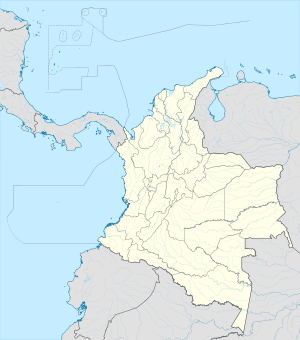
The Revolutionary Armed Forces of Colombia – People's Army is a Marxist–Leninist guerrilla group involved in the continuing Colombian conflict starting in 1964. The FARC-EP was officially founded in 1966 from peasant self-defense groups formed from 1948 during the "Violencia" as a peasant force promoting a political line of agrarianism and anti-imperialism. They are known to employ a variety of military tactics, in addition to more unconventional methods, including terrorism.
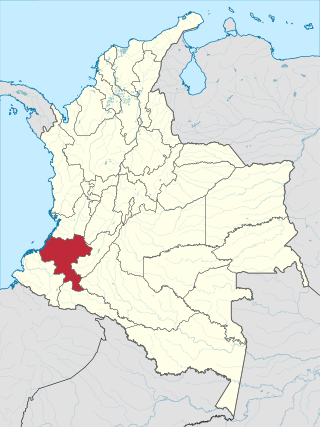
Cauca Department is a Department of Southwestern Colombia. Located in the southwestern part of the country, facing the Pacific Ocean to the west, the Valle del Cauca Department to the north, Tolima Department to the northeast, Huila Department to the east, and Nariño Department to the south. Putumayo and Caqueta Departments border the southeast portion of Cauca Department as well. It covers a total area of 29,308 km2 (11,316 sq mi), the 13th largest in Colombia. Its capital is the city of Popayán. The offshore island of Malpelo belongs to the department. It is located in the southwest of the country, mainly in the Andean and Pacific regions plus a tiny part (Piamonte) in the Amazonian region. The area includes 2.56% of the country.
Sucre is the constitutional capital of Bolivia.

Guillermo León Sáenz Vargas, more commonly known by his nom de guerre Alfonso Cano, was the commander of the militant group known as Revolutionary Armed Forces of Colombia. He succeeded founder Manuel Marulanda in March 2008 and commanded the Marxist rebel group until being killed in action by the Colombian Army.
The Western Bloc of the Revolutionary Armed Forces of Colombia was the smallest of the Revolutionary Armed Forces of Colombia's (FARC) blocs in size, although not in military capability. It was often held responsible for attacks that occurred in Cali and the surrounding area. The specific divisions of the group are arguable. Some of its divisions or fronts, as they were commonly known as, are shown below. Many of these fronts worked together at times towards a certain mission, while others were further divided into columns and companies with a smaller number of members. For more general information, see FARC-EP Chain of Command.
The Southern Bloc of the Revolutionary Armed Forces of Colombia was the first bloc to exist and is where the roots of the guerrilla movement lie. The bloc has been held responsible for several notorious attacks, including the infamous "donkey-bomb", numerous attacks against military bases, as well as Íngrid Betancourt´s kidnapping. It was also blamed by government investigators and prosecutors for the bombing of the El Nogal club. FARC itself denied that any of its members were responsible for the attack.
The Middle Magdalena Bloc of the FARC-EP was a FARC-EP bloc, notable for its involvement in the conflict with the AUC until the latter's demobilization in 2004. After that, it became one of the Colombian army's biggest worries as FARC started once again to gain control over the territory.

Achí is one of the 46 municipalities of the Bolívar department in the Caribbean Region of Colombia. It is crossed by the Cauca River and borders the Sucre department in the so-called Momposina Depression.
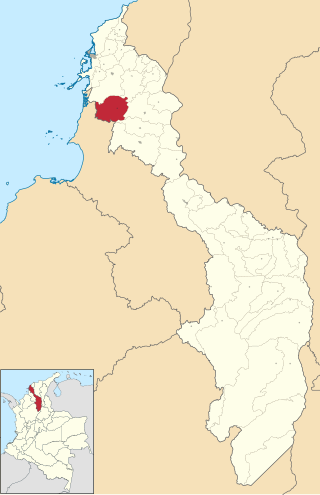
María La Baja is a town and municipality located in the Bolívar Department, northern Colombia.

Florida is a town and municipality located in the Department of Valle del Cauca, Colombia.
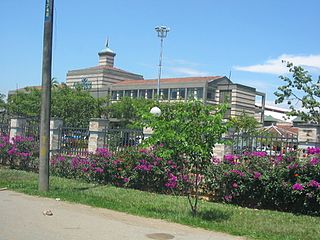
Jamundí is a town and municipality in the Department of Valle del Cauca, Colombia.

The Valle del Cauca Deputies hostage crisis refers to the kidnapping of 12 Deputies of the Assembly of Valle del Cauca, Colombia, on April 12, 2002 by members of the Revolutionary Armed Forces of Colombia (FARC) to pressure a prisoner exchange between them and the government and to negotiate the demilitarization of the municipalities of Florida and Pradera to initiate peace dialogues.

Tomás Medina Caracas also known as Tomás Molina Caracas and Negro Acacio was a Colombian guerrilla member of the Revolutionary Armed Forces of Colombia (FARC) considered by Colombian authorities the man in charge of the illegal drug trade business and the head of the Eastern Bloc's 16th Front of this rebel group.

Óscar Tulio Lizcano is a Colombian conservative politician and a member of the Colombia Conservative Party who was a congressman for the Department of Caldas. On August 5, 2000, while serving as congressman, Lizcano was kidnapped in Riosucio, Caldas, by the Revolutionary Armed Forces of Colombia (FARC) guerrilla group and held for 8 years. On October 23, 2008, he escaped captivity with the help of one of his jailers who took the decision to desert due to the immense pressure inflicted by the Colombian army on the rebel group.
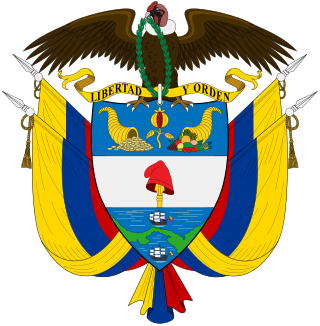
This is a timeline of events related to the Colombian armed conflict.
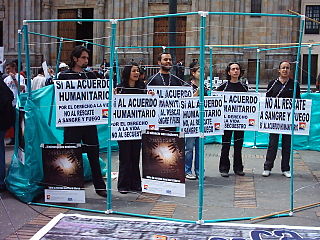
The Humanitarian Exchange or Humanitarian Accord referred to a possible accord to exchange hostages for prisoners between the Revolutionary Armed Forces of Colombia (FARC) guerrilla group and the Government of Colombia.

Pablo Catatumbo Torres Victoria is a Colombian politician. A former guerrilla leader of the Revolutionary Armed Forces of Colombia (FARC), he was part of their secretariat, FARC's higher command. Catatumbo took command of several FARC fronts in Chocó and Valle del Cauca in the 1990s, after which they grew in size and became strong enough to fight the paramilitary group AUC in the region.

Los Rastrojos is a Colombian drug cartel and paramilitary group engaged in the Colombian armed conflict. The group was formed by Norte del Valle cartel capo Wilber Varela, alias "Jabon" and one of his right-hand men, "Diego Rastrojo", around 2004 when Varela fell out with fellow-capo Diego Leon Montoya, alias "Don Diego". The group became independent after the murder of its main founder in Venezuela in 2008 and at its height was one of the most important drug trafficking organizations in Colombia.

The Clan del Golfo, also known as Gaitanist Self-Defense Forces of Colombia and formerly called Los Urabeños and Clan Úsuga, is a prominent Colombian neo-paramilitary group and currently the country's largest drug cartel.


